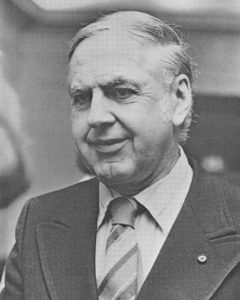
William Meredith, 1978.
I want to argue for a broader definition, a definition which will increase our sense of the multitudes that poetry contains. For those of us who care about poetry are apt to be consciously limited in our tastes and churlish about our distastes. We often have more precise ideas about what poetry is not than about what it is. And though we poetry users may be narrow partisans, this narrow flow of enthusiasm which we provide to our culture is all that makes the desert bloom.
T.S. Eliot said it in his high style, “the poetry of a people takes its life from the people’s speech and in turn gives life to it. And poetry represents the people’s highest point of consciousness, its greatest power, and its most delicate sensibility.”
Not many people in America today feel that a month of their lives has been impoverished—and this befalls millions—by the fact that no poem has enriched it. If this sounds highfalutin, nonetheless it’s true, and it says something bleak and serious about us. In Elliot’s high exact terms, poetry has served all vital cultures vitally. It affords delight. It sharpens the appetite for truth. It refines the medium to which we examine our lives. Like music, theater, and dance, it comes naturally, unless interfered with. It is a great natural recreation.
Poetry has always resisted its use as propaganda, simply because poetry, like all other creative things, contains and rejoices in contradiction, mystery, complexity. But my remarks have really been about readers. If some of my suggestions about reading meet with an open mind, they mean that when we engage a poem, we should credit it with infinite opinions, infinite options. Standards are important, but not until you know what kind of a beast you are judging can you tell whether it’s “best of class” or possibly just an ordinary mutt, possibly bright and lovable, possibly even the best hunting dog in the county. But perhaps it’s a geranium, or a new kind of spiced omelette which you have been trying to judge as a dog. What you have been asked to do, and this is hard enough, is to identify it, and then if possible, to like it.
excerpt from “Reasons for Poetry: Some Roles Contemporary Poets See Themselves Fulfilling,” a lecture by William Meredith presented on May 7, 1979 in the Coolidge Auditorium of the Library of Congress.
William Meredith (January 9, 1919 - May 30, 2007) served as U.S. Poet Laureate from 1978 to 1980. Other honors included a Pulitzer Prize for Poetry, a Guggenheim Foundation fellowship, the Harriet Monroe Memorial Prize, the Carl Sandburg Award, and a Los Angeles Times Book Award. He translated poetry from French and Bulgarian into English. Meredith's books of poems include Effort at Speech (1997), Partial Accounts (1987), Earth Walk (1970), and Love Letter from an Impossible Land (1944). He also published two books of essays. Meredith taught at Princeton University, the University of Hawaii, and Connecticut College; he served as a Chancellor of the Academy of American Poets from 1964 - 1987.